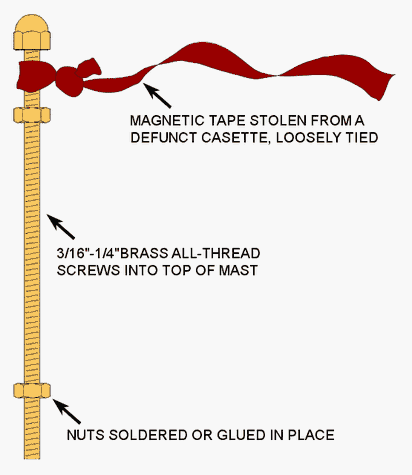| Send
items to chuck.leinweber@gmail.com
for inclusion here next month.
The Treasure Chest is a place to put those cool sailing,
cruising, motoring, boatbuilding or boating tips you have. Send
us your ideas... We just need a photo and a short description.
This time we have...
Telltale
Telltale attachment method.

John Kohnen
Posted to the PDRacer forum
JWBuilders Navigator 'Annalisa' centreboard downhaul
It's not fine art... but this should get the idea
across. Feel free to use the idea, and have someone
illustrate it better if you wish.

Dave
A Jig for Cutting Birdsmouths
 |
If you want to make very light spars, paddles
or oars (like I am making here) using the birdsmouth system
but don't want to cut any fingers off, you can make a simple
jig which will keep you far away from any rapidly moving metal
parts. |
 |
Start with a piece of tough foam plastic. Styrofoam
will not do. It should be the kind that you can bend and twist.
Take a block about 6 inches long (for these little staves)
and cut a rabbet in one corner, a bit smaller than your staves.
Now, screw the foam block to a piece of wood – be
gentle here, the screws will go all the way through the
foam so just tighten them enough to recess them a ¼”
or so. |
 |
Now clamp the block of wood and foam to the
fence of your table saw and adjust the blade to the right
angle. For eight sided birdsmouth like this one, I set the
angle to 45 degrees and run each stave through twice –
once from each end. The foam will keep the wood against the
fence and table for a perfect cut. I push the stave about
half way through then move to the back of the saw and pull
it the rest of the way. There is no way you can cut yourself
with this setup. |
Chuck
Thwart Position Question
As primarily a builder of sea kayaks, I made a "story stick"
for myself,
here's the how of it: I sat in the paddling position upon a plank,
and
balanced the plank on a broomstick. I then marked the locations
of my
"sit bones", my back side (back rest location), heels,
balls of feet
(foot braces), thighs (which you use to control a sea- or whitewater
kayak), and overall balance point -- my exact CG. All marks were
transferred to a smaller "yardstick" that hangs on my
shop wall. Very
handy indeed, it is referred to quite often on every project it
is
applicable to.
Kurt Maurer
League City, Texas
Dehumidifying Trick
Silica gel sachets in the plastic bag or storage box. Best thing
is they come free in all sorts of things from shoe boxes to dried
mushrooms. Also a good tip to extend the storage of opened gorilla
glue.
You can recharge the sachets by heating them to 220 degrees Fahrenheit
in a regular domestic oven. Careful you don't make a mess of the
oven if they have plastic covers though.
Titch
Cloth Tape
Your partners cloth measuring tape used for sewing is a great
way to measure the circumfrance of a curve on a bulkhead etc.
Return it before she gets home.
Also, shoe laces are great sail ties. The ends go easily through
the holes because they are bound.
Mike John
Flexible Anchor Mooring

Link HERE.
Robin
|

